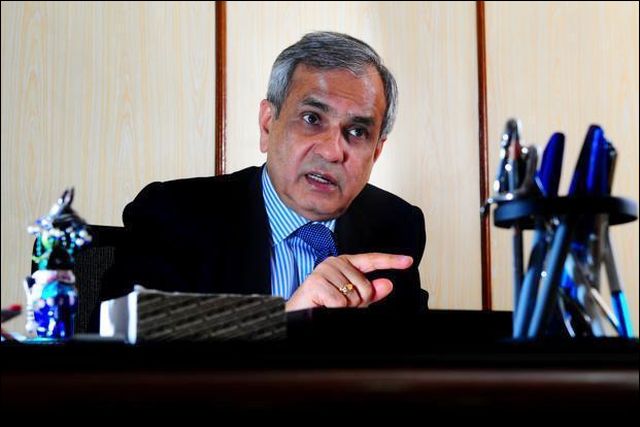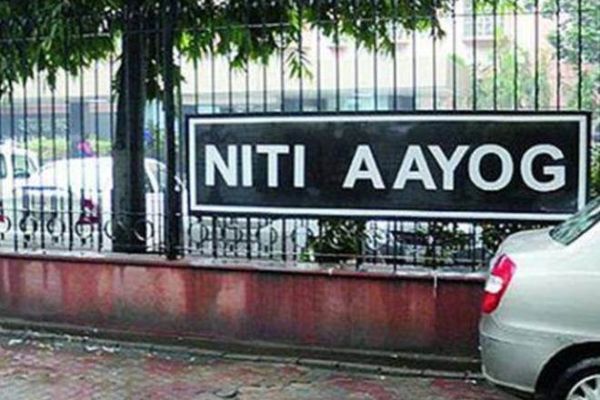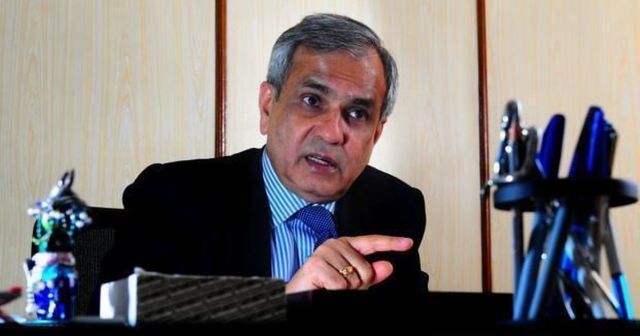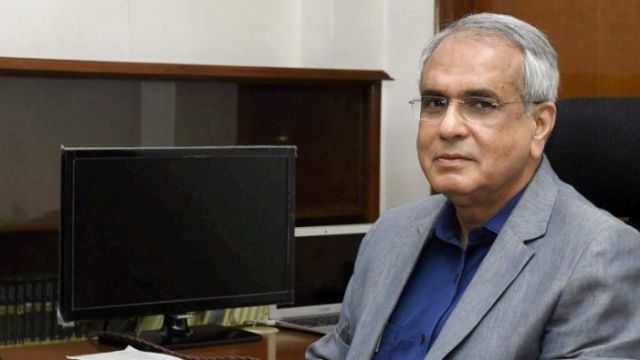
by admin | May 25, 2021 | Interviews, Politics

Rajiv Kumar
By Vishav,
New Delhi : Terming Congress President Rahul Gandhis promise of a minimum income guarantee to poor unimplementable, NITI Aayog Vice Chairman Rajiv Kumar says it is similar in nature to former Prime Minister Indira Gandhis ‘garibi hatao slogan.
He says India neither had the kind of fiscal space, nor the kind of complete data needed to implement the scheme.
Kumar also opposed the idea of Universal Basic Income, often advocated by former Chief Economic Adviser Arvind Subramanian, saying he favoured incentives for population to work.
The NITI Aayog Vice Chairman said the Congress needed to explain to the country how it can afford a scheme like minimum income guarantee.
“I don’t think it is practical. I think it is more rhetorical. It is similar in nature to ‘garibi hatao’. And I don’t think its implementation will be feasible. We neither have that kind of fiscal space, nor that kind of complete data that you need were you to be able to implement it,” Kumar told IANS in an interview.
“This is why, I think, the Congress has left all details completely unclear and have only made a broad announcement,” he added.
Former Finance Minister P. Chidambaram has, however, said that the broad contours of the scheme justifying its implementability would be explained in the Congress manifesto.
Rejecting the idea of Universal Basic Income for Indians, Kumar said: “I have not been a supporter of the scheme. For India’s per capita income and its demographic profile, I would much rather have incentives for work rather than incentives for being in on social security.”
“I think a lot of countries, especially something like China, have done very well by empowering their young in employment rather than putting them on doles,” he said.
The economist also defended the government’s newly-launched Rs 6,000 direct income support to farmers and rejected criticism that the amount was too little.
“About it being too less, the average income of a poor or marginal farmer household per month is probably in the range of Rs 3,000 to Rs 4,000. And in that context, an additional Rs 500 does not sound so little. It should not be dismissed, neither should it be demeaned.
“This amount can be used (by a farmer) to send his child to school, to buy rations, to buy water from large land-owners, and so many other things. It’s not a small amount,” he said.
“Another way to look at it is that in 10 years, you get Rs 60,000. It’s not a one-time sop. It’s a long-term relief. In terms of government expenditure, Rs 75,000 crore becomes Rs 7.5 lakh crore in 10 years. It’s a fair, significant fiscal burden,” he added.
Kumar said that one can always criticize a measure saying it is too little, but it has to be balanced with fiscal responsibility.
“Having seen poor households, I don’t think the sum is too small. It is a significant percentage of total income, not something that disappears in the decimal as you would tend think.”
He added the criticism that the scheme leaves out a large part of urban poor out of its net was also unfair and said only 13.7 per cent of farmers were tenants even out of which, 80 per cent owned some land or the other.
“So hardly anyone is left out among the agriculture farming households. The only people who are not included are the landless labour. That is only 2.6 per cent of the rural population. That has been left out because for them, there is MNREGA. That is what gives them social security,” Kumar said.
“The coverage is not narrow. It covers 12 crore households – around 60 crore people. It is much bigger than any farm loan waiver would cover, which are by nature skewed or biased towards larger land-owners.”
In a sharp criticism of loan waiver schemes announced by the newly-formed governments in the Hindi-heartland states of Rajasthan, Madhya Pradesh and Chattisgarh, he said it was not the answer to agricultural distress.
“Farm distress can be sorted out through true modernisation of the sector – convert farmer from mere producer of commodities to a producer of agricultural value products. The second part of solving the crisis is to connect the farmer to the market – get logistics in place.
“And finally, you have to lower the cost of production in agriculture. At the moment, Indian agriculture products are higher-priced than global prices. There I think, one has to move away from the model of increasing doses of chemical inputs into agriculture, resulting in higher cost, higher debt and higher distress. We need to shift to bio pesticides, bio-fertilizers,” Kumar said.
—IANS

by admin | May 25, 2021 | Corporate, Corporate Governance, Economy, Markets, News, Politics
 New Delhi : Indian stock exchanges need to further reconcile their regulatory functions with market interests in order to protect and promote the interest of retail depositors, NITI Aayog Vice Chairman Rajiv Kumar said on Wednesday.
New Delhi : Indian stock exchanges need to further reconcile their regulatory functions with market interests in order to protect and promote the interest of retail depositors, NITI Aayog Vice Chairman Rajiv Kumar said on Wednesday.
Speaking at the National Stock Exchange of India (NSE)’s silver jubilee celebrations here at which the NSE unveiled its new logo, Kumar also urged domestic capital markets to bring about better reconciliation between the Indian spot and derivative markets so as to win the confidence of small investors.
“Our exchanges perform regulatory functions and here they need to consider if there is a trade-off between that and profit maximisation,” he said.
“This is required to protect the interests of retail depositors, so that the markets can go ahead with the work of inorganic growth.”
The NITI Aayog Vice Chairman said that a reflection of the situation is seen in the fact that despite best efforts of the NSE, only two per cent of Indian households have come into the capital market.
“In the common Indian mind, the stock market is still a ‘satta’ (gambling) bazaar over which they have no control … a place controlled only by the big players,” Kumar said.
“The NSE should aim like it is in the US, for instance, where 40 per cent of the households are involved in the capital market.”
Kumar noted in this regard that the size of derivatives trading in India is more than 40 times the “underlying equity trading” and called for better reconciliation between the two to boost retail investors’ confidence in the stock markets.
“While the stock exchanges have done a great deal to bring the SME segment of the economy into the capital markets, the bourses need to do more to integrate more small and medium enterprises with the capital market,” Kumar said.
Former Prime Minister Manmohan Singh, who was the Finance Minister when the NSE was established in 1994, was also present on the occasion, along with Union Transport Minister Nitin Gadkari and Delhi Lieutenant Governor Anil Baijal.
As per the World Federation of Exchanges, the NSE is 3rd largest exchange in the world in terms of volume of trades, while it is ranked No. 1 on index options contracts and No. 2 on currency derivatives contracts.
The NSE’s new logo is a reworking of its earlier one with the addition of marigold, yellow, red and blue, symbolising integrity, excellence, trust and commitment.
“The multiple colours capture the multifaceted nature of the business, with red denoting NSE’s strong foundation, yellow and orange being inspired by the marigold flower that signifies prosperity and auspicious ventures, and the blue triangle is a compass, always future-oriented and helping us find our true North,” an exchange statement said.
“The new brand identity reflects NSE’s multi-dimensional nature: multiple asset classes, multiple customer segments and its multiple roles including that of an exchange, regulator, educator and market developer,” it added.
—IANS

by admin | May 25, 2021 | Corporate, Corporate Governance, News, Politics
 New Delhi : NITI Aayog Vice Chairman Rajiv Kumar on Tuesday said people have paid a “very high cost” for democracy in the last 70 years and it is now time to reap the dividends. He insisted that NITI Aayog, as a “principal change agent”, can help garner those dues.
New Delhi : NITI Aayog Vice Chairman Rajiv Kumar on Tuesday said people have paid a “very high cost” for democracy in the last 70 years and it is now time to reap the dividends. He insisted that NITI Aayog, as a “principal change agent”, can help garner those dues.
“We have paid a very high cost for our democracy in the past 70 years. It’s very clear. Otherwise we could have…anyway. But now is the time when NITI Aayog will help us in earning the democratic dividend,” Kumar said in response to a query by IANS on how NITI’s role was different from the erstwhile Planning Commission.
“It is time to get the democratic dividend which would come from states competing for good governance and good delivery of public services and not by having competitive populism,” he said.
Kumar said that the Aayog is a “complete new entity” as compared to the Planning Commission because it works as “partners to the states” and not as “people who hand out doles to the states”.
“We, therefore, don’t hold durbars in the NITI Bhavan. I have actually taken the trouble and met Chief Ministers of 21 states in their state capitals. I visit them. Completely the reverse of what Planning Commission used to be,” he said.
Speaking about NITI Aayog not having any financial powers, he said it had the “power of ideas and the power to implement them”.
“By the way, some of my friends tell me that I have come at a wrong time when the NITI Aayog has lost all powers to disburse money. But we have got the power of ideas and the power of implementing those ideas, both at the central level and much more at the state level, trying to get them (states) replicate the best practices,” Kumar said.
“And here let me say — and this is my wish and hope — that if we go along the way we are going, on which the Prime Minister has been sort of directing us all the time to go, we will become one of the principal change agents in this economy,” he added.
He said that the NITI Aayog has the potential and the ambition to do it.
“We can bring the states on the same page, we can make them compete with each other,” Kumar said.
On the question of economy not creating enough jobs, Kumar said the allegation of “jobless growth” is “mithya” (falsehood) and has no substance.
He, in line with what the Prime Minister said recently, insisted that not enough data is available on the jobs.
Asked if the government is shifting the goalposts after four years by hiding behind the pretext of not having sufficient data on growth, Kumar said: “Not at all. We are not shifting the goalpost. My predecessor (Arvind Panagariya) had taken this up in a major way in the second year itself. It takes time to tackle such an important question.”
“The decisions have been taken, the financial resources have all been allocated. The Ministry of Statistics and Programme Implementation has already had a household survey in the field.
“The change in employment can only come when the first quarter is repeated in the 5th quarter. Then only you know the change Quarter-to-Quarter. Therefore it is taking time. But we will get the best data every year, not just once in five years,” he said.
—IANS

by admin | May 25, 2021 | Interviews

Vice Chairman of Niti Aayog, Rajiv Kumar
By Vishav,
New Delhi : Petroleum is the taxation milch cow for the central and the state governments and it is unlikely to be brought under the Goods and Services Tax (GST) any time soon.
That’s also the view of the Vice Chairman of Niti Aayog, Rajiv Kumar. Several senior ministers have demanded that petroleum products — basically petrol and diesel — be brought under the the new taxation regime.
But says Kumar: “It (oil) can’t be brought under GST. That’s because the total state and central taxes on petrol put together are around 90 per cent right now.”
He told IANS in an interview here: “I can’t see how any state will take a cut so huge as the highest rate under the GST is 28 per cent. A new GST band will have to be opened up — and that will be an enormous exercise.”
While supporting “in principle” the idea of bringing all items under the new indirect tax system, he said those talking about doing it now have not thought this through.
“The better way to do this is to first start reducing taxes (on petroleum products) as I have said many times in public. States impose ad-valorem tax on oil and so they all had a windfall gain (when prices rose). There is a need to rationalise it,” he said, adding “states should especially cut taxes.”
Kumar said that both the central and the state governments should start the process of weaning themselves away from their dependence on oil taxation.
According to him, the Central government collects Rs 2.5 lakh crore as tax on oil while almost Rs 2 lakh crore is collected by the states. “From where will they compensate it?” he asks adding that if the taxes are reduced gradually, the burden on the economy will get reduced.
“Higher oil prices are like a tax on the economy. If oil prices are brought down, economic activity will also improve,” Kumar said.
“Once that is achieved, once the revenues have gone up from other sources and the economy has picked up, then you can think of bringing oil under GST. It’s not that easy,” he added.
Ever since the new tax legislation was rolled out on July 1 last year, there had been talk of bringing it under the GST with top government officials and ministers supporting the need for such a move. The Opposition parties, of course, have been clamouring for it.
In December last year, Finance Minister Arun Jaitley had told the Rajya Sabha that the Central government was in favour of bringing petroleum products under the ambit of GST after building a consensus with states.
More recently, in April, when the international crude oil prices were going up sharply, pushing the domestic petrol prices to record levels, BJP President Amit Shah told a rally in Mumbai that efforts were on to bring petrol and diesel under the GST.
From Road Transport and Highways Minister Nitin Gadkari to Petroleum and Naural Gas Minister Dharmendra Pradhan, almost every senior BJP minister has favoured bringing petroleum products under the GST.
Among states, Maharashtra Chief Minister Devendra Fadnavis has also expressed willingness to bring petrol and diesel under GST in his state if a consensus was brought about on it.
Kumar says he was in favour of such a change, but it has to be thought through in practical terms.
“I am just simply saying that let’s not try to hurry it because you would only run into problems as there is a huge dependence on oil,” he said.
“Even electricity should be brought under GST. Everything should be under GST. But I am not sure whether it is worked out yet. Let’s agree to bring it under GST but over a period of time as is practical,” he said.
(Vishav can be contacted at vishav@ians.in)
—IANS

by admin | May 25, 2021 | Interviews

NITI Aayog Vice Chairman Rajiv Kumar
By Vishav,
New Delhi : Even as the ruling BJP and its senior leaders have repeatedly attacked the Congress for leaving behind a legacy of “governance failure”, “policy paralysis” and “economy in shambles”, the Central government can no more use this as an excuse and will have to take ownership of not only its accomplishments but also its failures from now on, NITI Aayog Vice Chairman Rajiv Kumar said.
He said while it was necessary to look at the last four years of the Narendra Modi government in the context of the legacy it inherited from the UPA regime in 2014, the economy has now overcome those issues and henceforth, the government should be judged on its own merit.
“Now the economy has come out of those inheritance issues. No more should they be used as an excuse for anything. Whatever happens now is the government’s own (doing) completely,” Kumar told IANS in an interview.
“After all the government has done so much despite all of it (legacy issues). It took huge structural reforms like demonetisation, GST, Insolvency and Bankruptcy Code, Benami Act, RERA and recapitalisation of banks to overcome those legacy issues. I think we have finally overcome those and henceforth, the government should be judged on its own merit,” he added.
Kumar’s remarks hold significance since the Bharatiya Janata Party (BJP) and its senior leaders, including Prime Minister Narendra Modi and Union Minister Arun Jaitley have repeatedly ripped into the Congress for leaving behind an “economy in a shambles” which the government was still bringing on track.
Be it the crisis relating to non-performing assets, the Nirav Modi-linked PNB scam, the sorry state of the banking sector, the slow GDP growth rate, the fiscal deficit situation and even the rising oil prices, the BJP leaders have used every opportunity to blame it all on the legacy it inherited from the erstwhile UPA government.
Even the NITI Aayog Vice Chairman has often talked about the legacy inherited by the current government and how it has affected its performance.
“For a government which had inherited the most terrible economic situation and inherited a situation where there was a complete paralysis in governance and decision making, and also a situation where world economy was also not very good… given the legacy, given the world economy and given the breakdown of governance, I think this government has done very well,” Kumar said.
He added that when the BJP took over in 2014, the inflation had crossed the 9 per cent mark and growth rate had slumped to below six per cent.
“What (then Finance Miniser P.) Chidambaram had done was to allow the fiscal deficit to run from 2.8 at one time to as far as 6.4 per cent. From there to come to a situation where we have now achieved a growth rate of 6.7 per cent last year and 7.7 percent in the last quarter with inflation at 3.8 per cent, I think that’s just remarkable,” he said.
The fiscal deficit for 2017-18 was 3.5 per cent and the government has set the target of bringing it down to 3.3 per cent in the current fiscal.
The noted economist added the economy was much more balanced than it was before and had been pulled out of a crisis — a “crisis of complete private sector investment having been stopped because of the NPAs and the twin-balance sheet” problem.
“Not only has this government maintained the macro-economic balance and brought back growth on its track but along with it, it has made the economy far more cleaner and much more formalised, while also doing a lot to improve inclusion,” he said.
Asked if there are any areas where the government could have performed better, Kumar responded: “One clear role which the government has recognised is farmer’s income. I think this focus has now been brought into the budget. The agriculture sector remains a backward sector and it requires a lot of reforms.”
He added that performance in export sector was a cause of concern while the water sector, which was turning into a crisis situation, was another area which needed attention along with the quality of education.
“These are chronic issues. They take time to be figured out. But the credit should be given to the government that they have recognised these problems and is not trying to hide them or brush them under the carpet. Also they are trying new approaches to improve the performance like ranking states on education quality, water conservation, health,” Kumar said.
(Vishav can be reached at vishav@ians.in)
—IANS




